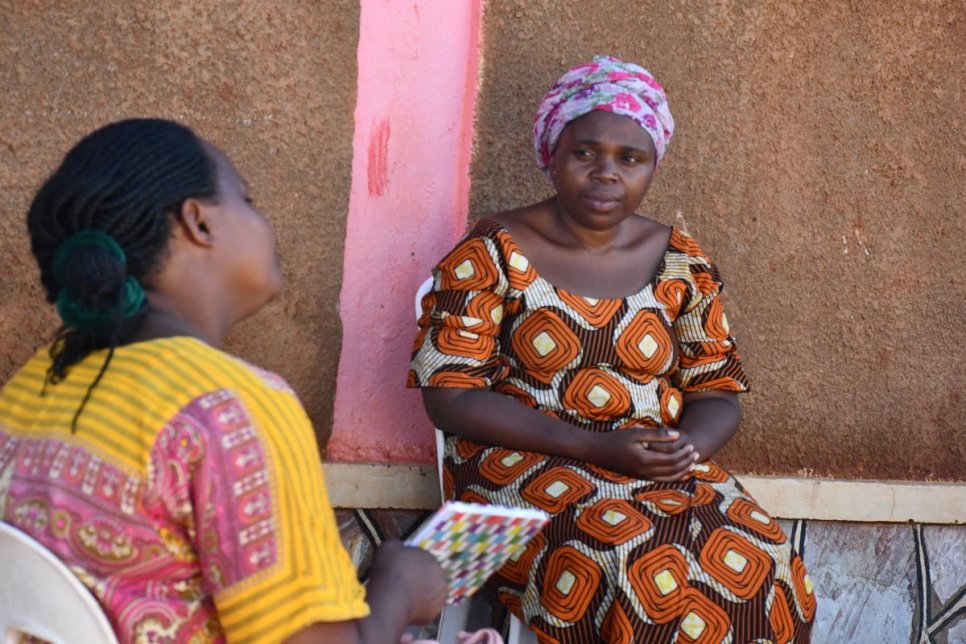Urban refugees struggling to survive as economic impact of COVID-19 worsens in East, Horn and Great Lakes of Africa
This is a summary of what was said by UNHCR spokesperson Charlie Yaxley – to whom quoted text may be attributed – at today's press briefing at the Palais des Nations in Geneva.

Refugee mothers in Kampala, Uganda, whose livelihoods have been impacted by the coronavirus lockdown. © UNHCR/Duniya Aslam Khan
Refugees in urban areas across the East, Horn and Great Lakes region of Africa are struggling to meet their most basic needs as the economic impact of COVID-19 begins take hold.
UNHCR, the UN Refugee Agency, is working closely with governments and partners to find solutions for urban refugees in these challenging times. However, we fear that without further support, many urban refugees will become extremely vulnerable to exploitation, risk falling into significant levels of debt and may be forced into desperate situations to survive, such as transactional sex or child labour.
Urban refugees are facing job losses as businesses are forced to downsize or close due to COVID-19 restrictions. Many were daily wage workers or worked in the informal economy and were already living hand-to-mouth before the pandemic struck. For example, in Rwanda, most of the 12,000 urban refugees have seen the family wage earners lose their jobs; many had been working for businesses that have closed or are struggling to import commodities due to border restrictions.
Many urban refugees are also living in overcrowded and unhygienic conditions and are particularly vulnerable to the spread of the virus, as in Kenya where thousands of refugees live in impoverished neighbourhoods in Nairobi with little access to clean water, making it nearly impossible to practice regular hand washing.
In both Rwanda and Kenya, UNHCR has been providing emergency cash assistance to the most vulnerable and exploring options to expand programming. In Uganda, UNHCR and WFP are introducing one-off cash assistance for some 80,000 urban refugees using mobile money to help cover rent, food and other key items. However, these are only temporary measures and socio-economic conditions are expected to deteriorate further in the coming weeks and months.
Across the region, most governments have already generously included refugees in their COVID-19 national contingency and response plans. UNHCR calls on States to ensure that as part of these plans, urban refugees additionally have access to social safety nets providing health insurance, food and cash assistance, which the international community should further support.
Many refugees are calling UNHCR informing us they are desperate for help with rent and are facing eviction by their landlords. In Djibouti, UNHCR is working to find alternative accommodation arrangements for refugees and host community members evicted from their homes. Considering the unprecedented nature of pandemic, we urge governments and landlords across the region to develop solutions that would put in place a moratorium on evictions, at least until the crisis subsides.
Refugee children have been particularly impacted by COVID-19 prevention measures, with schools across the region having closed. While most governments have attempted to plug this gap by offering classes through the internet, TV or radio stations, many families lack the required equipment or are unable to afford internet data bundles.
UNHCR and education partners are pursuing a range of solutions including printing home study kits and uploading learning content onto phones in Uganda. In Kenya, the local mobile company, Safaricom, is providing free daily data bundles to some urban refugee students. UNHCR calls on the private sector to follow this example and play a pivotal role in helping ensure refugee kids receive the education they deserve by donating radios, smartphones, tablets, laptops and connectivity options.
UNHCR urges the international community to support its emergency response with further funding so that we can meet the rapidly rising needs before the situation reaches breaking point.
As part of the broader UN Global Humanitarian Response Plan, UNHCR is requesting some US$745 million for life-saving interventions in response to COVID-19, of which $126 million has been requested for countries in the East, Horn and Great Lakes of Africa.
UNHCR’s Bureau for the East and Horn of Africa and the Great Lakes region covers 11 countries: Burundi, Djibouti, Eritrea, Ethiopia, Kenya, Rwanda, Somalia, South Sudan, Sudan, Tanzania, Uganda.
For more information on this topic, please contact:
- In Nairobi, Dana Hughes, [email protected], +254 733 440 536
- In Geneva, Charlie Yaxley, [email protected], +41 795 808 702
- In Geneva, Babar Baloch, [email protected], +41 79 513 9549
